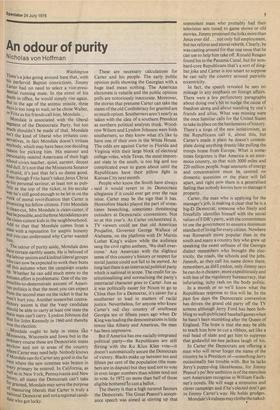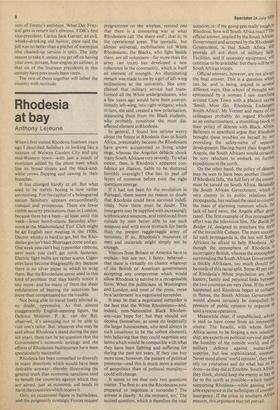An odour of purity
Nicholas von Hoffman
Washington There's a joke going around here that, with his perfervid Baptist convictions, Jimmy Carter had no need to select a vice-presidential running mate. In the event of his death in office, he would simply rise again. Rut in the age of the atomic missile, three days is too long to wait, so he chose Walter, or Fritz as his friends call him, Mondale. , Mondale is associated with the liberal segMent of the Democratic Party, but too much shouldn't be made of that. Mondale isn't the kind of liberal who irritates conservatives, in fact Mondale doesn't irritate anYbody, which may have been one deciding reason for picking him. His manner and Personality remind Americans of their high school civics teacher, quiet, earnest, decent and dull. It's not that the Minnesota Senator is stupid, it's just that he's so damn good. Even though Fritz hasn't taken Jesus Christ as his personal saviour, at least not as publielY as the top of the ticket, in his secular way he's still good enough to be let in on the Work of moral revivification that Carter is Promising his fellow citizens. Fritz Mondale iS clean-cut, Mrs Mondale is clean-cutter, if that be possible, and thethree Mondalettes are the clean-cuttest kids in the neighbourhood. Add to that that Mondale comes from a state with a reputation for aseptic honesty and You can understand why Carter wanted him.
,.. The odour of purity aside, Mondale does '!ave certain earthly assets. He is beloved of tue labour unions and kindred liberal groups Who can now be expected to work their butts uff this autumn when the campaign cranks °P. Whether he can add much more to the autumn effort is problematic. One of the imPossible-to-demonstrate axioms of Amerierari Politics is that the most you can expect Lrom the second man on the ticket is that he vQdn't hurt you. Another somewhat contradictory axiom is that the Veep candidate should be able to carry at least one state the luain man can't carry. Lyndon Johnson did that for John Kennedy in 1960 and thereby W on the election.
, Mondale ought to help in states like -minnesota, Wisconsin and Iowa but in the Ordinary course these are Democratic states anyhow and not in areas of the country v'here Carter may need help. Nobody knows if Mondale can do Carter any good in the far West where the new nominee was beaten in every primary he entered. In California, as ‘i'ell as in New York, Pennsylvania and New ferseY, all states the Democrats can't take 13r granted, Mondale may serve the purpose of reassuring liberals that Carter is truly a national Democrat and not a regional candiuate Who got lucky.
These are necessary calculations for Carter and his people. The early public opinion polls showing the Georgian with a huge lead mean nothing. The American electorate is volatile and the public opinion polls are notoriously inaccurate. Moreover, the stories that presume Carter can take the states of the old Confederacy for granted are so much opium. Southerners aren't nearly as taken with the idea of a southern President as northern political analysts think. Woodrow Wilson and Lyndon Johnson were both southerners, so they know what it's like to have one of their own in the White House. The odds are against Carter in Florida and Virginia with their large block of electoral college votes, while Texas, the most important state in the south, is too big and too complicated even to guess about until the Republicans have their pillow fight in Kansas City next month.
People who know the South have always . said it would revert to its Democratic allegiance if it could ever get over the race issue. Carter may be the sign that it has. Heretofore blacks played the part of sometimes beseeching, sometimes threatening outsiders at Democratic conventions. Not so at this year's. As Carter orchestrated it, TV viewers could see that old American Poujadist, Governor George Wallace of Alabama, on the platform with Dr Martin Luther King's widow while the audience sang the civil rights anthem, 'We shall overcome.' Any American with the slightest sense of this country's history or respect for social justice could not fail to be moved. At long last there is an interracial political party which is national in scope. The credit for institutionalising and normalising the party's interracial character goes to Carter. Just as it was politically easier for Nixon to go to China than for a Democrat, it's easier for a southerner to lead in matters of racial justice. Nevertheless, for anyone who knew Carter's red clay country of southwest Georgia ten or fifteen years ago when Dr King was leading the demonstrations in little towns like Albany and Americus, the man • has been impressive.
But if America has one racially integrated political party—the Republicans are still flirting with the Ku Klux Klan vote—it doesn't automatically assure the Democrats of victory. Blacks make up between ten and fifteen per cent of the population (the numbers are in dispute) but they tend not to vote in even larger numbers than whites tend not to vote. In 1972 no more than half of those eligible bothered to cast a ballot.
The theory is that a high turnout favours the Democrats. The Great Peanut's acceptance speech was aimed at stirring up that somnolent mass who probably had their television sets tuned to game shows or old movies. Jimmy promised the folks more than Jesus ever did . .. not only full employment, but tax reform and moral rebirth. Clearly, he was casting around for that one issue that he can use to help him take off. Ronald Reagan found his in the Panama Canal, but for nonhard-core Republicans that's a sort of dingbat joke and Carter is too smart to suppose he can rally the country around patriotic eccentricity.
In fact, the speech revealed he sees no mileage in any emphasis on foreign affairs. There were a few perfunctory paragraphs about doing one's bit to nudge the cause of freedom along and about standing by one's friends and allies. What was missing were the once familiar calls for the United States to take its place on the battlements of history. There's a tinge of the new isolationism, as the Republicans call it, about this, but Carter's made it plain he doesn't contemplate doing anything drastic like pulling the troops home from Europe. What is sometimes forgotten is that America is an enormous country, so that with 3000 miles and 220 million people, huge amounts of energy and concentration must be, centred on domestic questions or the place will fall apart, and right now there is a generalised feeling that nobody knows how to manage it properly.
Carter, the man who is applying for the manager's job, is making it clear that he is a big-D Democrat, someone who freely and forcefulty identifies himself with the social values of FDR's party, with the commitment to use the government to ensure a minimum standard of living for every citizen. Nowhere was Roosevelt more popular than in the south and many a country boy who grew up speaking the sweet softness of the Georgia dialect remembers who brought the electricity, the roads, the schools and the jobs. Jimmih, as they call his name down there, remembers, as did Lyndon, only Jimmy says he can do it cheaper, more expeditiously and with less of the regulatory bureaucracy, that infuriating, itchy rash on the body politic.
In a month or so we'll know what the Republican response to this will be. In the past few days the Democratic convention has driven the grand old party off the TV screens although Jerry Ford has been hobbling to well-publicised baseball games when he hasn't been stumbling after the Queen of England. The hope is that she may be able to teach him how to cut a ribbon, act like a real head of state and get him to suppress that godawful tee-hee jackass laugh of his.
In Carter the Democrats are offering a man who will never forget the name of the country he is President of—something Jerry occasionally has trouble with. But he lacks Jerry's puppy-dog likeableness, for Jiminy Peanut's po' boy ambition is of the merciless sort Americans recognise in William Faulkner's novels. He will wage a strenuous and clever campaign and if he's elected don't get in Jimmy Carter's way. He holds grudges.
Mondale's kindness may clothe the naked ness of Jimmy's ambition. What Der Fritzical gets in return isn't obvious. FDR's first vice-president, Cactus Jack Garner, an evil, whisky-drinking old horror, once said the job was no better than a pitcher of warm piss (the cleaned-up version is spit). The only reason to take it, unless you get off on having your own, private, four-engine jet airliner, is that six of the fourteen presidents in this century have previously been veeps.
The two of them together will lather the country with rectitude.



































 Previous page
Previous page